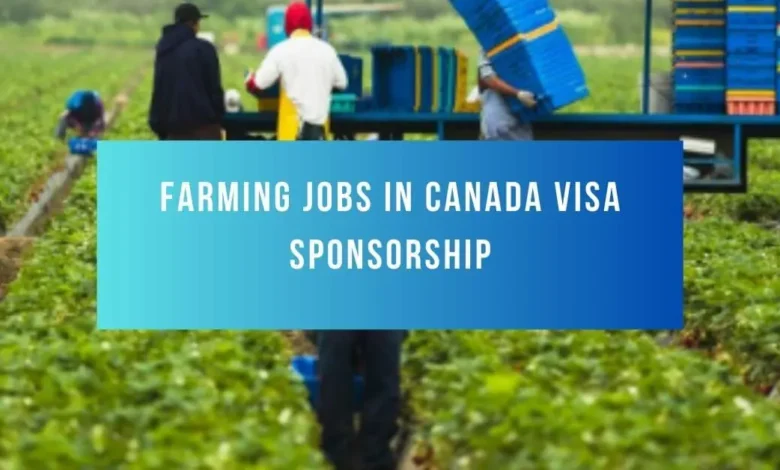Farming Jobs in Canada Visa Sponsorship

The farming and agricultural businesses in Canada are good places to make money for both Canadians and people from other countries. There are many rewarding jobs in farm management and similar fields, so people from all walks of life can find one. This includes professionals, non-professionals, and students.
Details about Farming Jobs in Canada
People who want to work on farms or in agriculture in Canada are in high demand, especially newcomers and Canadians who are looking for well-paying jobs. There may be different job descriptions for these roles based on the employer and the needs of their farm.
Responsibilities
- Fixing Agricultural Tools and Equipment: It is very important to keep tools and equipment used in farming, like tractors, plows, and harvesters, in good working order so that the farm stays efficient and productive.
- Crop and Livestock Sales Representation: As a sales agent, you market and sell crops and animals raised on your farm to buyers, who could be local markets, wholesalers, or direct consumers.
- Making Choices About Livestock or Crop Management: To get the best yields and profits, it’s important to make well-informed choices about how to handle livestock, which crops to grow, how to plant them, and when to harvest them.
- Tasks Must Be Changed to Fit Seasonal Changes: Tasks in farming must be changed to fit seasonal changes, weather trends, and crop growth cycles. This could mean planting crops in the spring, watering them when it’s dry, and gathering the foods in the fall.
- Overseeing the Crop Production Process: Managing the whole crop production process means planning, organizing, and keeping an eye on everything that happens, from planting seeds to gathering crops, to make sure that every step is done correctly and quickly.
- Maintaining Farm Buildings and Equipment: Keeping barns, store buildings, and irrigation systems in good shape helps keep them from breaking down and extends their useful life.
- Buying Essential Items: Buying essential items like fertilizer, seed, pesticides, and tools makes sure that farms have everything they need to produce crops well.
- Keeping Records: Keeping correct records of money, taxes, work, and employees helps keep track of costs, check work output, and meet government rules.
Qualifications
- Prior Work Experience in Agriculture: Working in agriculture gives you important knowledge about how to farm, handle crops, take care of animals, and run machines. It shows that you know how to do things and processes that are common in farming, which is important for doing well in farming jobs.
- Strong Communication Skills: Being able to talk to other farm workers, sellers, buyers, and other important people needs to be possible. Communication that is clear and to the point helps everyone understand and do their jobs properly, which promotes teamwork and productivity on the farm.
- Physical fitness and manual dexterity: Farming often requires physically demanding tasks, like moving big things, running machines, and working outside in all kinds of weather. To do these chores safely and quickly, you need to be physically fit and have good hand-eye coordination.
- Understanding of Best Practices in Farming: To get the best yields and keep the land healthy and fertile, you need to have a good understanding of best practices in farming, such as crop rotation, soil management, pest control, and animal husbandry.
- Ability to Adapt to New Tasks and Environments: Farming is a dynamic job where tasks and goals change all year long based on the seasons, weather, and crop growth cycles. Being able to adapt to new jobs and environments is an important part of farming because it helps farmers deal with problems and opportunities that come out of the blue.
Read Also: Agriculture Farming Jobs in Canada With Visa Sponsorship
Jobs in Agriculture in Canada
Some common farming job titles in Canada include:
- Farm General Manager for Fruits and Vegetables.
- Deputy Manager of Fruit and Vegetables.
- Winter Harvest Farm Workers.
- Store Workers.
- Delivery Specialists.
- Quality Control Officers.
- Farm Supervisors.
- General Labor Workers.
Pay for Farming Jobs in Canada
A study by Salary Explorer found that the average farm worker in Canada makes about $72,000 CAD a year. Salaries range from $30,200 CAD to $178,000 CAD a year. Pay rates depend on things like the job, the work contract, and the employer’s ability to pay.
Farm Jobs with Visa Sponsorship in Canada
Employers in Canada can help foreign workers get visas, which makes it easier for them to come to the country legally to work on farms. This visa sponsorship could include paying for the trip and giving proof to help with the visa application process. People from other countries who have a sponsoring visa can apply for a number of farming jobs in Canada.
Conclusion:
Canada’s farming jobs offer a wide range of options for people who want to work in agriculture and have a fulfilling career. There are many jobs that professionals, non-professionals, and students can do, from taking care of crops to keeping an eye on animals. Working on farms in Canada can help you get financially stable and grow as a person because the pay is good and you can get a visa sponsored.
Frequently Asked Questions
What qualifications are required for farming jobs in Canada?
Usually, you need to have worked in agriculture before, have good communication skills, be physically fit and dexterous, know the best ways to farm, and be able to adapt to new jobs and environments.
What is the average pay for farming jobs in Canada?
Salary Explorer says that the average farm worker in Canada makes about $72,000 CAD a year. However, salaries can range anywhere from $30,200 CAD to $178,000 CAD a year, based on the job, the contract, and the employer.




